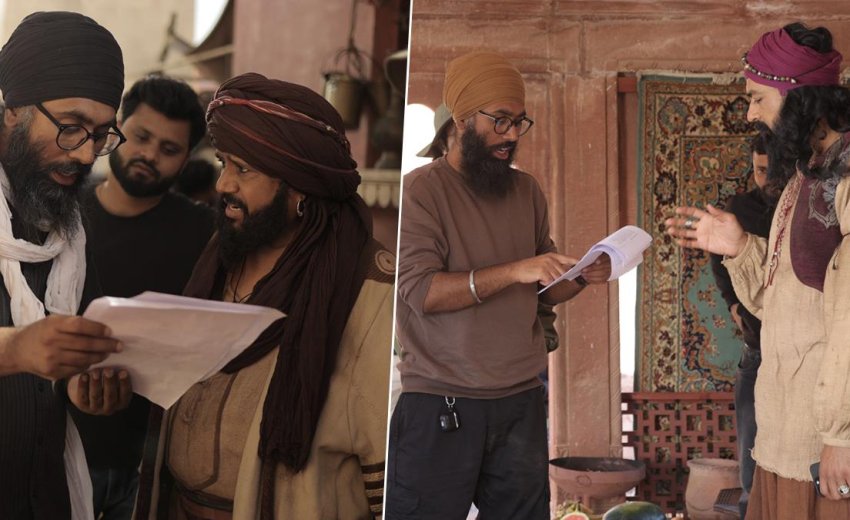Sharan Art, the acclaimed Punjabi film director, has come a long way since he first made waves at the SikhNet Film Festival with his powerful short film "Bridge to the Soul" in 2013. Today, he stands as a testament to the power of determination and passion in the world of cinema. With a journey that began in Ludhiana, Punjab, India, Sharan Art has not only won awards but has also earned the hearts of countless moviegoers worldwide.
In 2013, at the age of 25, Sharan Art's talent shone brightly as he was honoured with the "Light in the Dark Award" at the SikhNet Film Festival for his poignant short film, "Bridge to the Soul." This film delved into the emotional journey of an expectant father who grapples with the responsibility of bringing a girl into the world. Constrained by societal norms and parental expectations, the protagonist finds solace and a connection to his inner self when he encounters his childhood teacher.
Sharan Art's ability to convey complex emotions and social issues through storytelling is evident from the beginning. "Bridge to the Soul" is a stirring exploration of gender discrimination and societal pressures, showcasing his talent for tackling relevant and thought-provoking subjects.
A renowned Punjabi film director
Fast forward to the present day, and Sharan Art has firmly established himself as a formidable director in the Punjabi film industry. His body of work includes notable films such as "Galwakdi" and "Rabb Da Radio 2," both of which received a warm reception in cinemas. What sets Sharan Art apart is his commitment to breathing new life into every character and story he takes on, leaving a lasting impact on the audience.
His recent project, "Mastaney," is a testament to his dedication to telling compelling stories rooted in Sikh history and culture. This unique film offers a window into the unyielding spirit of the Sikh community, capturing their unwavering determination and courage through breathtaking visuals and storytelling.
Mastaney: History through Punjabi cinema
"Mastaney" is an epic tale that transports viewers to the year 1739, a pivotal period in Indian history. It draws inspiration from the rise of Sikh warriors who stood against the mighty Mughal empire during that era. Through a fictional narrative centred around five common men, the film celebrates the bravery and valour of the Sikh community, drawing wisdom from the teachings of Sikh gurus such as Guru Hargobind Singh, Guru Teg Bahadur, and Guru Gobind Singh.
The plot unfolds after Nader Shah's army faces a humiliating defeat at the hands of a faction of rebellious Sikhs during his retreat from India. Seeking revenge, Nader Shah enlists the help of Lahore governor, Zakariya Khan, who, in turn, recruits four ordinary performers, enticing them with money to impersonate Sikhs. However, as they immerse themselves in their roles, they undergo a remarkable transformation, embodying the indomitable spirit of Sikhism. In the end, they display extraordinary valour as they stand against Khan's army and ultimately become martyrs. Nader Shah, witnessing their courage, predicts that one day, Sikhs will rule the region.
Director Sharan Art spoke passionately about "Mastaney," and said, "Mastaney is a labor of love that aims to honor the valor and resilience of the Sikhs. It's an endeavor to bring forth their extraordinary journey in a way that's both moving and enlightening. This film not only pays homage to history but also serves as an inspiration for contemporary times. "
Mastaney features a stellar cast led by Tarsem Jassar in the role of Zahoor and Gurpreet Ghuggi portraying the character of Qalandar. Simi Chahal and Karamjit Anmol grace the screen with their exceptional performances in supporting roles as Noor and Basheer, respectively. The film also introduces Sameep Ranaut as the young Qalandar, Honey Mattu as Zulfi, Baninder Bunny as Feena, Avtar Gill as Zakariya Khan Bahadur, Rahul Dev as Nader Shah, and Arif Zakaria as Zakariya Khan's wazir. The film captivates audiences not only in Punjabi but also in its dubbed versions in Hindi, Telugu, Tamil, and Marathi, making it a cultural sensation on a grand scale.
Over the years, Sharan Art has held the directing baton in the Punjabi cinema industry. His ability to tackle relevant social issues while delivering engaging cinematic experiences has earned him a well-deserved place in the hearts of moviegoers. As he continues to tell compelling stories that resonate across generations, Sharan Art stands as a shining example of the transformative power of cinema. His journey from the SikhNet Film Festival to becoming a renowned moviemaker is a testament to the remarkable potential that lies within those who dare to follow their dreams and tell their stories on the big screen.

